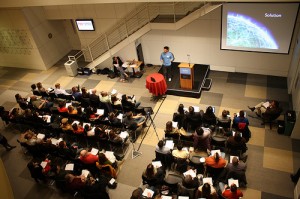She said she uses every possible tool at her disposal to keep her kids challenged, their eyes focused, and their curiosity piqued. Most of her textbooks gather dust in the corner of her room, she said, and she hasn't touched a Scantron in years. She's broken down the barriers to learning without leaving the system -- within the boundaries of her classroom.
A parent chimed in: "We can't abandon the schools," she said. "There are things that are working."
But another former public school teacher said he left after three years when he was offered a job in Silicon Valley. He was frustrated by the confines of his job and those dreaded standardized bubble tests, and thought he could improve the education system from outside the fray.
About the changing relationship between teacher and student, adult and child: "Teachers have fear about not knowing the answer," one educator said. "But the question is far more important than the answer."
Another teacher talked about not having access to valuable tech tools because of school administrators' fears. "They don't want to put kids at risk of being mugged, or they don't trust them with the gadgets," she said.
Beyond the use of technology, they talked about the importance of taking kids out to the natural world and conducting "jailbreaks" -- leaving school grounds to get outside.
Before these smaller group discussions, speakers presented their ideas about how they would re-imagine the education system. The ideas ranged from building story-telling time with elders in the community into the curriculum, to leveraging social media, to taking the classroom outdoors to using tactile DIY tools as a way to complement high-tech learning devices.
Regardless of their particular vantage point, they were each there for a reason -- to listen to and convey their ideas to improve the education system. Here's to keeping that torch lit.


